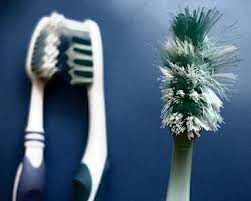This four-part article series takes a closer look at the 11 toothbrushing mistakes people frequently and unwittingly make when caring for their pearly whites.
Welcome to the final installment of this four-part article series on the top 11 toothbrushing mistakes we should all do our very best to avoid. So far, the implant dentist in Chicago has explained the following 9 points:
Mistake # 1: Not using the correct toothbrush.
Mistake # 2: Thinking that an electric toothbrush will do all the work for you.
Mistake # 3: Not brushing correctly.
Mistake # 4: Not choosing the right bristles.
Mistake # 5: Not brushing long enough or often enough.
Mistake # 6: Brushing too hard and/or too often.
Mistake # 7: Using the same starting point every time.
Mistake # 8: Only brushing the front tooth surfaces.
Mistake # 9: Not rinsing your toothbrush afterwards.
Let’s now take a look at the two final tooth brushing mistakes...
Chicago Dental Health: Tooth brushing Mistake # 10
Not Letting Your Toothbrush Dry between Brushes

“Bacteria thrive in moist environments, so if your toothbrush doesn’t air and dry properly in between uses, it’s probably acting as a nesting ground for these micro-organisms,” explains the implant dentist in Chicago.
Here are some recommendations for toothpaste storage:
- Place your toothbrush upright in a glass so that it’s not lying in a pool of water next to the sink.
- Avoid using those airtight toothpaste caps, because they prevent moisture from evaporating off the bristles.
- Store your toothbrush in a closed medicine cabinet so that water vapor from the flushing toilet won’t settle on it.
“Moisture doesn’t only encourage bacterial growth; it can also miss-shape toothbrush bristles, which results in a less than satisfactory cleaning ability.”
Chicago Dental Health: Toothbrushing Mistake # 11
Not Changing Your Toothbrush Frequently Enough

When last did you buy yourself a new toothbrush? According to Chicago dental healthcare experts, you should be replacing your toothbrush every three or four months or as soon as it starts looking frayed. You’re not very well going to keep a diary of when you change your toothbrush so a better rule of thumb is to hit the shops as soon as the bristles lose their usual flexibility and begin to break apart.
“In order to do the best possible job of cleaning your teeth, your toothbrush’s bristles should be straight and emerge at a 90° angle. A frayed toothbrush is ineffectual, so if yours has become so, it’s time to buy a new one!”
A Final Note
Brushing your teeth is a crucial component of the home oral hygiene routine that will keep your teeth in beautiful lifelong condition. While this habit tends to become second nature to us all, you should never just fly on auto-pilot while doing it. The next time you brush your teeth, pay attention to what you do and where you could improve your brushing technique. Take a closer look at your toothbrush - is it time to buy a new one? Could you be storing it better? Do you brush frequently enough? Try timing yourself to see just how long you normally brush your teeth for.
Follow the advice provided in this four-part article series by the Chicago implant dentist and you will surely reap the rewards!







